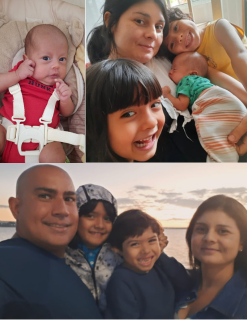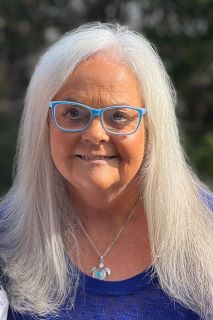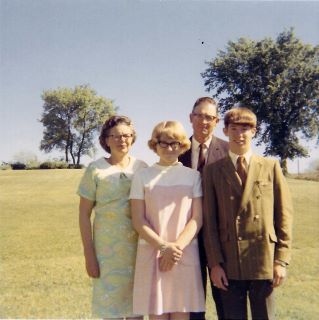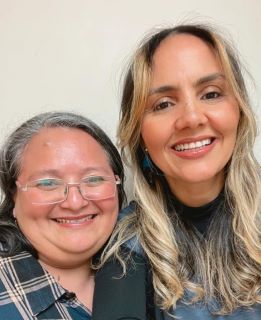-
Teaching and Learning Styles
 Written by Jocelynn Goff, mother of Iron Rose Sister Ministries’ Founder and Director Michelle J. Goff
Written by Jocelynn Goff, mother of Iron Rose Sister Ministries’ Founder and Director Michelle J. GoffWhat’s your learning style? I’ve been asked that question at several medical appointments. The nurse wanted to know how I would best receive the information and directions from the doctor.
There is purpose in knowing our own learning style for ourselves, in a classroom, our workplace, a doctor’s appointment, daily conversations, and more. There’s also purpose for understanding this in our relationships and interactions with others. When we interact with a child, family member, friend, neighbor, or coworker it is helpful if we can understand even a little bit of how they learn to have realistic expectations for their retaining the information we are sharing.
There are four basic types of learning styles: visual, auditory, read/write, and kinesthetic.
If I’m a visual learner, then the doctor’s approach could be to show me a picture of the affected part of my body or write a list of directions out for me. To help myself process and retain learning I could use a picture, a graph, a daily organizer, a list, or see a finished product. In relationships, I could utilize those same tools. Obviously, it would be a natural process and not a “let me teach you this way” kind of format.
For an auditory learner, the doctor may give verbal instructions and quite possibly ask me to repeat them back to him. To help myself or in relationships, I could possibly ask if the information can be repeated back either verbatim or by rewording it using their or my own words. A song can also be a useful tool for imparting information. Family stories passed down through the generations are an additional significant, powerful learning tool.
If read/write is my best learning style, then the doctor may share a website for me to research or give me a printed copy of the diagnosis and instructions. Additionally, I can seek other reliable sources in books, websites, journals, or other recommended documents. For myself and in relationships, rewriting the information or just reading it for myself are useful tools.
For a kinesthetic learner, a hands-on approach is best, so the doctor may use a model of the affected body part for me to touch and possibly a simulation of movements that are helpful in the healing process. For myself and in relationships, effective hands-on types of activities include drawing, cooking, eating, taking a hike alone or with a friend, planting a garden, or creating an artistic design.
God, who created learning styles, used all of them in the celebration of the Passover meal. Before Easter, I was reading about Pesach Seder (Passover meal) in an article our Bible class teacher shared. This part of the reading jumped out at me,
“…the Pesach Seder is one of the most carefully constructed learning experiences ever created. In an amazing combination of aural and tactile learning tasks, the Seder has something for everybody—a drink, food, symbols, prayers, songs, stories, philosophy, text study, simulations, ritual actions—all designed with one overall goal” to take each person at the Seder back to Egypt, to re-enact the dramatic Exodus story, to make each one of us feel as she or he had actually been redeemed from Mitzrayim (Egypt).”This exposure in all of the learning styles ensures that the overall goal is accomplished for each individual to experience Passover and its significant meaning.
Similarly, Jesus, as the Master Teacher, employed all of the learning styles. For the visual learner, He let His listeners visualize the birds of the air and the lilies of the field in Matthew 6:25-33. For the auditory learner, He gave the Sermon on the Mount in Matthew 5-7. For the read/write learner as He spoke to an expert in the Law, “What is written in the Law?” He replied, “How do you read it?” (Luke 10:26). For the kinesthetic learner, there are a plethora of examples, such as when He feeds the 5,000 (Mark 6:30). He even employs several styles at once when He draws with His finger on the ground (John 8:6). Jesus is truly the Master Teacher and gives us every opportunity to know Him and learn from His teachings in our own learning style.
The book, Called to Listen by Michelle J. Goff, employs the various learning styles through 40 days of listening: “to the Good Shepherd, the Creator, the Father, the Son, the Spirit, and through the five senses.” This may even expand your learning abilities in styles you’ve previously been unaware of that speak to you.
I encourage you to find your learning style and begin to recognize this in the relationships around you. I invite you to read Called to Listen to hear the message our Heavenly Father speaks “… through His Word, through nature, through Christian brothers and sisters, even through silence…” This book offers you prompts to use your five senses and explore your learning style.
So, are you primarily a visual, auditory, read/write, or kinesthetic learner? Share or demonstrate in the comments!
Footnote:
This Seder outline was adapted from The Art of Jewish Living: The Passover Seder by Dr. Ron Wolfson, published by the Federation of Jewish Men’s Clubs and the University of Judaism, 1988. Additions and edits by Daniel B. Stockstill, 1999. -
Teaching and Learning through Relationships
 Written by Michelle J. Goff, Founder and Director of Iron Rose Sister Ministries
Written by Michelle J. Goff, Founder and Director of Iron Rose Sister MinistriesIn Matthew 28, we hear the final words of Jesus before His ascension. Verse 18 reminds us that all authority in heaven and on earth has been given to Him.
19 Therefore go and make disciples of all nations, baptizing them in the name of the Father and of the Son and of the Holy Spirit, 20 and teaching them to obey everything I have commanded you. And surely I am with you always, to the very end of the age. (Matt. 28:19-20)
“Go” and “make disciples” are the two commands of ultimate importance as Jesus’ final instructions. The two ways in which we fulfill the command to make disciples are baptizing them and teaching them. Then finally, we hear the promise that Jesus will continue to be with us. Amen!
These facets of the Great Commission are integrally connected to the Greatest Command: to love God and love others. Can we truly make disciples outside of relationship with God or others? The teaching would be limited to lists of instructions or rote information without relationship. “Teaching them to obey” is different than “telling them what to obey.”
I cannot properly teach someone how to make an arepa without first introducing them to this Venezuelan staple. I could tell them what to make, even provide detailed directions, but both of our levels of frustration will be high if I cannot demonstrate how to make it. Subsequently, if my pupil felt defeated and her arepas didn’t turn out well, she will be less likely to make them again on her own.
Conversely, if I explain how to make arepas, step by step, standing by her side and illustrating with my own dirty hands how to prepare the masa and form the arepas, when to flip them, and when they were ready to eat, my student will feel better equipped to continue in the process. Then, we sit down and continue our time together by eating and deepening our friendship, a memory is made, and a connection is built.
The next time my student friend wants to make arepas, she has been set up for success and, if she has a problem, she knows exactly who she can call! We even celebrate together when she sends me a picture of her family eating her imperfectly formed arepas. She is practicing and developing her skills. And she is not alone. Her growing confidence in how to follow the instructions has been encouraged by her teacher. They delight in sharing a good meal and both are inspired to do it again.
The teaching and the learning happened in relationship.
Iron Rose Sister Ministries’ vision is to equip women to connect to God and one another more deeply. The founding principles of that vision and our 2023 theme draw from the Greatest Command (Mark 12:30-31) and the Great Commission (Matt. 28:18-20), inspired by the imagery of Jesus as the True Vine and us as the branches called to bear fruit (John 15). We cannot fulfill any of those commands without relationship! Through the blog posts, virtual events, and other resources, we will emphasize the relational aspects of these three biblical texts: “Teaching and Learning through Relationships.”
First and foremost, our relationship with God is foundational.
4 Remain in me, as I also remain in you. No branch can bear fruit by itself; it must remain in the vine. Neither can you bear fruit unless you remain in me. 5 “I am the vine; you are the branches. If you remain in me and I in you, you will bear much fruit; apart from me you can do nothing. (John 15:4-5)
Secondly, the “much fruit” of our relationship with God will be more disciples, which brings us back to the Matthew 28 text. I love how God ties it all together and brings it full circle!
Thirdly, the ongoing relationships with God and with one another are reiterated throughout the remainder of the New Testament.Luke’s narration of the early church, Paul’s letters, Peter’s reminders, as well as John’s and James’ instructions all provide affirmation of the important of relationship.
If you are not familiar with these scriptures or have not known the blessing of these relationships, we invite you to connect with these promises and commands. Ladies, we especially want to illustrate these foundational truths in the ways God has called us to teach and learn through relationships.
This year, we will follow the same pattern established in 2022 for our blog posts. Tuesdays will describe teaching and learning through relationship(s) in the Bible. Thursdays will illustrate a similar relationship dynamic from one of our stories. Bible stories and God stories… there is so much to teach and to learn!
Thank you for joining us! We will continue to introduce the topic through Jesus’ own example in January. Then, February, our well-established prayer month, will continue the Bible stories and God stories, especially in our relationships and communication with God.
-
Thankful for Deliverance in Christ
 Written by Rianna Elmshaeuser, volunteer with Iron Rose Sister Ministries in Colorado
Written by Rianna Elmshaeuser, volunteer with Iron Rose Sister Ministries in ColoradoImagine one fine day you are taking a walk and come across a dog in pitiful circumstances. He’s starved and filthy. His hair is patchy and his neck is swollen and dirty because of the chain around it that’s attached to a large steel stake in the middle of a patch of dirt that passes for a yard. Your heart is moved to help this pitiful creature so you knock on the door of the owner and offer to buy the dog. The price is steep, but you gladly pay it to rescue the poor creature. On your way home, you come across a lovely park so you take the chain off your new dog’s neck and set him free. Now that he's free of the chain and his terrible master, you leave the dog at the park and hope he lives a happy life from now on.
That would be absurd! Jesus does not do that with us either. He didn’t redeem us from slavery to sin and then set us free to figure out the rest on our own. Romans 8:6-7 (NIV) says,
The mind governed by the flesh is death, but the mind governed by the Spirit is life and peace. The mind governed by the flesh is hostile to God; it does not submit to God’s law, nor can it do so.
Just as you would take your new dog into your home and treat his wounds, feed him food, give him a safe place to live, teach him how to behave, and show him real love, Jesus does the same for us. Saving us from our sins entails so much more than confessing Him as Lord and getting baptized.
Jesus sent the Holy Spirit to guide us and help us grow into a Spirit-led life. This process can be excruciating at times. Facing my problems and negative behaviors, and having the humility to realize I needed to change certain things has been a long and often lonely journey. Even more painful can be embracing who God created me to be. At this stage in my life, I have learned to trust Him and bit by bit have been growing into who He wants me to be. I am so grateful for that growth and change.
Of course, I still make mistakes but rather than berating myself and losing nights of sleep, I can make it right and move on. I have learned to see people more like God sees them; that includes myself. To be totally honest, as I write this, I am at a low point. Experience has taught me that I am not here alone. Jesus is my Savior constantly, not just for the forgiveness of my sins. Zach Williams sings, “It might feel like Friday, but your Sunday’s coming.” Before Jesus rose from the grave, there were some dark, dark days when all felt lost. God has plans that we can’t see or understand. Even when it is dark, we can cling to Jesus’ hand and trust that He will bring us through it.
As Paul writes in 2 Corinthians 12:9, “But he said to me, ‘My grace is sufficient for you, for my power is made perfect in weakness.’” If we were always strong and never down, we would have no need of Jesus. God uses our weaknesses to bring us closer to Him and to each other. I have learned that my weakness gives me compassion for the weakness of others. How can I judge and condemn when I myself am broken? I may be traveling through darkness right now, but “even the darkness is not dark to [God]; the night is as bright as the day, for darkness is as light with you” (Ps 139:12 ESV).
God continues to save us from our sins, from ourselves, and from Satan again and again and again as long as we follow Him.
“There is therefore now no condemnation for those who are in Christ Jesus” (Ro 8:1).
-
Thanksgiving Brings Us Joy
 Written by Kathy Reagan, volunteer with Iron Rose Sister Ministries in Arkansas
Written by Kathy Reagan, volunteer with Iron Rose Sister Ministries in ArkansasRejoice in the Lord always, again I will say rejoice!
Philippians 4:4 (ESV)
God’s Word, in this passage and other places, tells us that as daughters of the King, it is His will that we live joyful, fulfilled, abundant lives here on earth.
But sometimes, it can be difficult to rejoice, can’t it? So how can we rejoice at those times?
I think one answer to that question can be found in 1 Thessalonians 5:16-18: “Rejoice always, pray without ceasing, give thanks in all circumstances, for this is the will of God in Christ Jesus for you.”
When we are prayerful and thankful, we are happy and rejoicing.
Giving thanks to God is a mindset.
- Check our focus. We know that whatever we focus on tends to grow bigger and bigger in our lives. Colossians 3:2 tells us “Set your mind on things that are above, not on things that are on earth.” When we’re thinking about heaven and serving the King during our time here on earth, we are thankful and rejoicing.
- Be aware of our enemy’s schemes. He wants us complaining, feeling sorry for ourselves, blaming others, and blaming God. “Your adversary the devil prowls around like a roaring lion, seeking someone to devour” (1Pe 5:8). But our Father’s will for us is to “Do all things without grumbling or disputing, that you may be blameless and innocent children of God…” (Php 2:14-15a). When we are following His directions, we are thankful and happy.
- Train ourselves. We humans naturally tend to see the negatives, hear the negatives from others, and sometimes even imagine negative things that are not necessarily even there. However, with training and practice we can develop a habit of turning the negatives into positives. God calls us to grow and strive for maturity in the faith (2Pe 3:18) so that we can eat solid spiritual food and not just milk. “But solid food is for the mature, for those who have their powers of discernment trained by constant practice to distinguish good from evil.” (Heb 5:14). We train ourselves each time we purposefully choose to take a negative thing and look for the positive so we can give thanks to God for it.
Recognize that we are swimming in blessings!
- It’s a matter of perspective. Proverbs 27:7 says, “One who is full loathes honey, but to one who is hungry, everything bitter is sweet.” When the enemy invites us to recount all our woes, we can be tempted to just give in and have our own little pity party. But we don’t have to give him the victory! Even in the midst of mourning or terrible tribulation, it is possible to rejoice in thanksgiving because we know heaven is our home at the end of the road here on this earth. We know we have the Spirit inside us, guiding us, strengthening us, and comforting us. We know who we are and Whose we are.
Sing out our thanksgiving to God.
- James 5:13b says “Is anyone cheerful? Let him sing praise!” I’m frankly not sure if we sing because we are cheerful or if we become cheerful by singing—maybe a bit of both. I love to sing praise and often wake up with a song in my heart. But in the past, I have purposely sung praise when I was very downcast, and God has always blessed my effort to praise Him. We can always find something to thank Him for, and it is a delight to think of our praise rising to God like a pleasant aroma in His nostrils.
It's been a little over three years now since my godly husband of 47 years passed away suddenly from Covid. God is the one who carried me through that unthinkable time. He surrounded me with loved ones who helped lift me up and bear my burdens. And now He has blessed me beyond measure by gifting me a godly man to walk with me over the finish line of life! We have been married a few months now and we enjoy praying and singing praise. (He is a wonderful tenor!) So, I can truthfully say at this time in my life that I am singing this prayer with David:
You have turned for me my mourning into dancing; You have loosed my sackcloth and girded me with gladness, that my soul may sing praise to You and not be silent. Oh Lord, my God, I will give thanks to You forever. (Ps 30:11-12)
It is much easier to overflow with thanksgiving in the good times. But as daughters of the King, it IS possible (no matter what the enemy says) to rejoice even in terrible tribulation and mourning.
Sisters, allow me to invite you to focus on thanksgiving in the good and the bad times and watch how our Father delights in blessing us with joy.
Song of praise: God is so good
-
Thanksgiving Instead of Worry
 Written by Karla Cass, volunteer with Iron Rose Sister Ministries in Colorado
Written by Karla Cass, volunteer with Iron Rose Sister Ministries in ColoradoAs a therapist I see clients riddled with anxiety walk in and out of my office daily. Anxiety among our nation’s children and youth is at an all-time high. The current generation is one of the most anxious generations in history, but Christ calls us to something different. Philippians 4:6-7 (ESV) tells us,
Do not be anxious about anything, but in everything by prayer and supplication with thanksgiving let your requests be known to God. And the peace of God, which surpasses all understanding, will guard your hearts and minds in Christ Jesus.
As I ponder this verse, I am taken back to a time when I felt the most anxiety in my own life and when I felt I had very little to be thankful for. In a world full of things that can make us anxious, how can we be obedient to scripture and allow “the peace of God, which surpasses all understanding” to enter our lives?
The Trial
Dear sisters, I will confess that I often struggle with God’s timeline, which has been a main source of my anxiety in the past. I had a particularly difficult time with God’s timing in the spring of 2018. My husband and I were blessed with a beautiful baby girl the day before Christmas in 2014. We discussed expanding our family and I had a definite vision for what our family should look like. After two years of trying to have additional children, we turned to medical professionals for guidance. Right before Easter I received an infertility diagnosis and was told my eggs were of “poor quality.” The irony was not lost on me that while the world was decorated with brightly colored eggs, I was told mine were old and dusty! In a moment, the vision of my family was demolished along with my faith. The enemy used this news to separate me from God and increase my anxiety and depression. I found it very hard to be thankful for any of the numerous gifts God had previously blessed us with. My anxiety about our future and what our family would look like increased daily, and I lost faith in what I had always believed in: that God was always working for our good. Yet despite my attitude and lack of faith, He was still working on my behalf. God continued to work things out for our good and for the good of others because He can see vastly more for our lives than we ever can.God Never Fails
During 2020, I was blessed with the opportunity to start a support group along with some church friends for women also going through infertility. We were able to lift one another up, support each other, and point one another to Christ. God used my difficult circumstances to bring myself and others closer to Him. In January of 2021, God exceeded every expectation and we found out we were pregnant with our son. He was the perfect addition to our family at just the right time. Through this trial, God worked things out for our greater good and gave me the privilege to serve others walking a similar path.When we face great trials, how can we increase our gratitude and decrease anxiety about the future?
Relying on the Spiritual Disciplines
I found three spiritual disciplines helpful in drawing me closer to Him and increasing my faith in a time of difficulties.1 - Keeping a daily gratitude journal helped me focus on the things God had given me and see that He has a perfect plan for my life and gives me exceedingly more than I could hope or pray for.
2 - The spiritual discipline of silence and solitude helped me to drown out the thoughts and opinions of this world and keep my eyes on Christ and what He wanted for my life. It made me carve out time for prayer and supplication. Through this practice, I was able to meditate on scripture and decrease comparison, jealousy, and anxiety which were robbing me of the joy God wanted for me.
3 - Lastly, I increased my time in the Word and was devoted to the memorization of scripture to combat anxious thoughts used by the enemy to make me doubt God and His will for my life.
Though my struggle with infertility was difficult, God used this time to increase my faith and draw me closer to Him. What spiritual disciplines can you incorporate in your daily life to stop the cycle of anxiety and start living the full life God wants for you?
-
The Beautiful Body of Christ
 Written by Ann Thiede, volunteer with Iron Rose Sister Ministries in Arkansas
Written by Ann Thiede, volunteer with Iron Rose Sister Ministries in ArkansasI grew up going to one of two churches in our small community. The church was the building. Church also was something that happened on Sundays in the sanctuary of the building. Church did not happen downstairs in the large area with the coke machine— just get-togethers with people who went to that church.
Church had importance, yes, but not enough to cause me to continue going when on my own in college. However, when my serious search for truth began, I went to one right off the university campus. The yearning intensified as I read the gospels, and reached a climax when I surrendered to Christ and shared in His death, burial, and resurrection through baptism.
The people in that church welcomed me warmly and attendance became a priority. It changed from “I have to go to church” to “I get to go to church!” The more I read the New Testament, the more I realized my view of church was misconstrued. It wasn’t the building; it was the people who surrendered to Jesus as Lord and Savior. I found answers to questions of faith and the church within its pages. Learning occurred every time the Bible was opened. I discovered the Acts of the Apostles—all about the beginning of the church and the believers' excitement to share the Good News about Jesus’s death and resurrection. What a great accounting! I strongly encourage you to read or reread Acts with fresh eyes.
In the Apostle Paul’s first letter to the Christians in Corinth, he paints a detailed picture of the church in chapter 12, referring to it as the body of Christ. Here is a portion:
Just as a body, though one, has many parts, but all its many parts form one body, so it is with Christ. For we were all baptized by one Spirit so as to form one body—whether Jews or Gentiles, slave or free—and we were all given the one Spirit to drink. Even so the body is not made up of one part but of many. (1Co 12:12-14 NIV)
It meant so much realizing I was part of Jesus’s body here on earth, His representative! Paul speaks as well to the church at Rome with these words:
For just as each of us has one body with many members, and these members do not all have the same function, so in Christ we, though many, form one body, and each member belongs to all the others. We have different gifts, according to the grace given to each of us. (Ro 12:4-6a)
“Each member belongs to all the others.” That is a radical concept. The church is not meant just to be Sunday worship, but members caring about each other daily, even as we care about the parts of our own body — all new to self-centered me. Over the years, I learned valuable and sometimes hard lessons in each church made up of gifted but imperfect people. One lesson: “Bloom where you’re planted.” Struggling to make connections within a large church, I began grumbling until hearing this: “What are you going to do about it?” So I began reaching out to unfamiliar people and hoping to meet visitors. Some new families became our lifelong friends. I also became part of a prayer chain. With joy, I met members we had prayed for when they recovered and returned to worship. Becoming an active part of a small group provided ways to encourage and be encouraged.
For fifty years within various bodies, God has patiently taught me. My first church had many who were gifted in sharing the Good News with others, and teachers who made the Scriptures, both Old and New Testaments, come alive in powerful and often convicting ways, increasing my love for the Word and a deeper love for God and others. In other churches I have been blessed to learn from those gifted with serving, praying, showing hospitality, giving, showing mercy, humbly leading, and encouraging others, to name a few. Sometimes God has allowed me to look back from wobbly steps in sharing my faith or encouraging others to a greater working of His Spirit. Always it is He who works in us for His good pleasure (Php 2:13). Above all, may love be our motivation as Paul admonishes in 1 Corinthians 13.
How are you blooming where you’re planted? The Holy Spirit excludes no one. You are of great value in the body!
-
The Breath of New Life
Written by Chrystal Goff, volunteer with Iron Rose Sister Ministries in Arkansas, and sister of Michelle J. Goff
“… The life I now live in the body, I live by faith in the Son of God, who loved me…” (Gal 2:20b NIV)
Faith. In the Son of God.
If you met me today, you might not expect that I spent many years adamantly hating the God I thought was talked about in church. I remembered hearing as a kid that He was a jealous God, and we should fear him. That sounded scary to a little girl. Combine that with the fact that every relationship I’d been in had been jealous and abusive. Why would I want to worship a God who would hurt me too? Whenever my mom would tell me she was praying for me, I always said, “Don’t. He’s not a nice dude. Don’t say my name to Him. Don’t say His name to me either.”
While I was hating God and hating my name, He still loved me. Every day, I see different ways He is redeeming the scars of my life to bring others out of darkness and to bring Him glory. I live by faith in the Son of God who has been so gracious to set an example of humility. I live by faith in my Creator who provided for me and sheltered me—always—especially when I was hating who I thought He was.
Now, I’m Spirit-led.
I’m the youngest of four girls. Each of us has eight letters in our names; mom’s does too. There wasn’t intentionality for eight-lettered names until the third daughter. In deciding the fourth daughter’s name, continuity was expected. However, the popular secular eight-letter names weren’t popular with my family. Someone suggested “Chrystal, with an H” instead of the traditional Crystal spelling. Everyone loved it. Everyone except the fourth daughter.
Growing up, my sisters all called me “Chrys,” So when I started kindergarten and roll was called, I acknowledged my presence when “Chris” was called… and my presence was mocked for confusing my name with a boy’s name. Hating the name I was given began.
A few years ago, I asked my sister to teach me the Bible. She’s worked in campus ministry and has loved Jesus way longer than me. I figured she was a good one to ask because her calendar was constantly full of “Coffee and Bible” appointments with students, and I wanted to get on her schedule. Inside she was screaming, “Hallelujah!”, but on the outside, she didn’t want to scare away the curious lost sheep. Slowly, she began revealing ancient truths in Scripture.
The day we were studying Genesis 17 where the LORD established His covenant with Abram and changed his name to Abraham, my eyes were opened to how long God has been loving me. LORD in Hebrew is written as four consonants (YHWH). YHWH is the proper name for God. YHWH is the literal breath of life. Without vowels in the Hebrew translation for YHWH, the pronunciation was unknown.
YaH – inhale
WeH – exhaleYHWH—The LORD added an H to Abram’s name and to Sarai´s. He was giving Abram and Sarai a forever reminder of His presence and a promise of covenant to provide for and multiply Abraham and Sarah’s descendants.
I paused. Putting the pieces together. An H. There’s an H in my name. Pausing in my thought to open my mouth and half ask/half state that’s why there’s an H in my name, a realization hit me: He’s always been with me, even when I hated Him. My sister and I started crying as we let this acceptance of love to and from my Eternal Father wash over us.
Now I love my name. I celebrate it. More of my old self dies each day as I wake up new and excited for His mercies. I wake up and wonder where the LORD will have me share His many mercies and blessings in my life.
-
The Humility that Comes from Above
 Written by Johanna Zabala, volunteer with Iron Rose Sister Ministries in Venezuela
Written by Johanna Zabala, volunteer with Iron Rose Sister Ministries in VenezuelaHumble yourselves before the Lord, and he will lift you up. (Jas 4:10, NIV)
The word humility connects me to the divinity of God. Today, I reflect on the depth of its meaning, which I have sought and seen so many times as I continually strive to live God’s purpose personally and spiritually.
I define humility as an act of the Spirit, which leads me to an attitude of the soul. Using the letters of the word, I break it down into the following characteristics:
Honesty
Unity
Meekness
Intelligence
Loyalty
Inclination (willingness)
Tenderness (love)
You serving the Heavenly FatherEach of the characteristics above has invited me, since the day I met Him, to stay in tune with Christ. By allowing me to be used by God, His beloved Son Jesus, and in the power of His Holy Spirit, I have seen His example of humility under submission, obedience, and continual awareness of putting the Father's will before my own, always with an eye toward the great goal that leads me to keep looking up to reach the prize of eternity.
I am also attentive to Peter’s admonition to “Humble yourselves, therefore, under God’s mighty hand, that he may lift you up in due time” (1Pe 5:6).
Therefore, being humble, in my experience, is a necessary spiritual action that undoubtedly brings me constantly into the presence of the Lord. In every area where I find myself, out there all around me, I require large portions of the Eternal Father's wisdom to be a humble child of God, chosen and called to service.
To be a child of God today, as the Bible says, is the greatest privilege I can have. It is a unique honor that has required in me great self-control.
At the beginning of my Christian life, I was filled with human pride, which counteracted humility in every situation. Many times, without realizing it, I felt self-sufficient, and my trajectory was more and more human than spiritual. I wanted to continue doing everything through my own strength rather than through God's. As time went by, I realized that I had to seek more vigorously at every moment the presence of God in everything, since only He knows and is capable of everything.
My first struggles, and the hardest, were with myself, thinking that I just needed to know that I had God, without the need to continue knowing Him fully. However, in those moments, the inner struggle of faith and humility had to continue to develop in me.
Through emotional trials of anxiety, later physical trials of sickness and loss, scarcity, and many more, and even wanting so many things in my timing and not in God's, He has allowed me to recognize, frontward and backward, the full authority of the Heavenly Father, the One who comes from above, for surely He alone is almighty, and in His infinite, true, and matchless mercy He will give me victory here on earth and there in heaven.
I have been able to experience the humility that God gives me in life through times of silence; in the solitude and peace of knowing Him in me, in wisdom, and in the prompt help that comes from Him. Humility is acknowledging His dominion, power, and glory forever.
So, I continue to fight to live consistently in the humility of God and not in the humility of humanity— to be able to live and make known the power of the Holy Spirit in the society in which I live. In this way, I intend to attain the wisdom of valuable and essential humility to arrive at eternal life with God.
We should not forget the beautiful examples and teachings of Jesus, who, with the power of the Holy Spirit, remained humble and overcame every trial and temptation, and we can also overcome them in His will. Are you humble today? Looking up to the eternal home? Do you radiate the humility of the Lord Jesus Christ here and now?
-
The Living God of Abraham, Isaac, and Jacob
Written by Elina Vath, Virtual Assistant for Iron Rose Sister Ministries in Ohio

Each week across city, region, country, and hemisphere, we commemorate together the death and resurrection of our Lord and Savior, Jesus Christ, through the Lord’s Supper. Redemption and salvation through Jesus were foretold in the garden of Eden, fulfilled in Jerusalem, and will continue until He returns.
Before His death, Jesus entered Jerusalem as King, just as the prophet Zechariah said He would. And although it was the last week of Jesus’ human life, He did not receive any relief from those who were determined to see Him fail. Time after time, Jesus looked straight into the hearts of the teachers of the law and completely annihilated their arguments. In a single day, Jesus sent the Pharisees, Herodians, and Sadducees home with their tails between their legs.
Chapter 22 of Matthew’s account of Jesus’ life tells us that the Sadducees attempted to trap Him with a question meant to disprove the resurrection. Jesus knew the scheming intention behind the Sadducees’ question for exactly what it was: a weak attempt to show His ignorance of Moses’ teachings, as if Jesus Himself hadn’t been there when Moses floated in a basket on the Nile, murdered the Egyptian, met his wife, removed his sandals, spread his arms over the Red Sea, and breathed his last.
I picture Jesus shaking His head, sighing a heavy sigh, and then effectively bulldozing the Sadducees' trap with these words, “You are wrong, because you know neither the Scriptures nor the power of God” (Matt. 22:29 ESV). No signs of intimidation or hesitation; rather, Jesus spoke with authority. “You are WRONG,” He told the richest, most powerful Jews of the time. But Jesus didn’t stop there. He then accused the Sadducees of not having done their homework, bringing the conversation to a full stop.
And as for the resurrection of the dead, have you not read what was said to you by God: ‘I am the God of Abraham, and the God of Isaac, and the God of Jacob’? He is not God of the dead, but of the living.(Matt. 22:31-32)
You see, Jesus knew Moses personally. And when God said to Moses in the book of Exodus, “I am the God of Abraham, Isaac, and Jacob,” Jesus watched as Moses was overcome by the sheer power of those words. Matthew tells us that Jesus’ wisdom and power in repeating these words had the same impact on the Sadducees and everyone who heard Him speak—they were all astonished.
Everything about God is alive. His words are alive, His Spirit is alive, His Son is alive, His kingdom is alive, and we are part of this living kingdom. Abraham, who looked at the stars in the night sky, as God made a promise, is alive. Isaac, the one through whom God began fulfilling that promise, is alive. Jacob, the forefather of Moses and someone used by God to preserve Jesus’ bloodline, is alive. Those who have gone before us are alive. Generation to generation, here we stand today, thousands of years later, as followers of the God of (the living) Abraham, Isaac, and Jacob.
Because of Jesus, who is the Life, you and I are counted among the stars in heaven. Generation upon generation of God’s people will live even after our bodies die.
May we all rejoice together at the history of our faith family, and that our names are written in the heavens as part of a promise that continues to be fulfilled.
-
The Multiplication Model of Bearing Fruit
 Written by Deanna Brooks, volunteer with Iron Rose Sister Ministries
Written by Deanna Brooks, volunteer with Iron Rose Sister Ministries2 Timothy 2:2 reads: “What you have heard from me in the presence of many witnesses entrust to faithful men, who will be able to teach others also” (ESV).
Paul is reaching the end of his life, and he wants this precious message to continue to be passed on.
“Entrust” indicates responsibility and stewardship. “Faithful” means those who will treasure what they have and handle it as God intended.
We, as disciples of Jesus, are the only way others will learn about Jesus and why He came to earth. We have been given a mission, and in John 15, Jesus shares His plans with His disciples.
Jesus paints a word picture of Himself as the Vine and His disciples as the branches that bear the fruit. Some of His statements are:
Verse 2: “Every branch in me that does not bear fruit he takes away, and every branch that does bear fruit he prunes, that it may bear more fruit.”
Verse 4: “Abide in me, and I in you. As the branch cannot bear fruit by itself, unless it abides in the vine, neither can you, unless you abide in me.”
Verse 5: “Whoever abides in me and I in him, he it is that bears much fruit, for apart from me you can do nothing.”
Verse 8: “By this my Father is glorified, that you bear much fruit and so prove to be my disciples.”
Verse 16: “You did not choose me, but I chose you and appointed you that you should go and bear fruit and that your fruit should abide, so that whatever you ask the Father in my name, he may give it to you.”
When a branch bears fruit, it provides the way by which other fruit can be produced. The branch that does not bear fruit is considered dead.
If you have ever grown a garden or fruit trees, you know an important part of having a healthy plant is to cut off dead or diseased limbs, so they do not weaken the healthy branches. Likewise, Jesus says He will remove those branches that are not bearing fruit.
Some of Jesus’ last words were, “Go therefore and make disciples of all nations…” (Mt 28:19).
There is joy in seeing someone you have taught become a follower of Jesus.
“Each one teach one” is a common saying among believers, indicating each of us is responsible for reaching someone who can then reach someone else, just as 2 Timothy 2:2 says.
Teaching about Jesus should be a normal part of our lives. Deuteronomy 6:4-9 emphasizes the importance of teaching when you sit in your house and when you walk by the way, when you lie down, and when you rise.
Some ways to reach out to others are:
- Invite someone to VBS, gospel meetings, or a Bible study.
- Invite your friend for coffee and tell her you have good news you want to share… Then share your faith story and the path that led you to be a Christ follower (to discipleship).
- When you are with a friend, ask what she believes, then listen. Be ready to share your common beliefs, but if she mentions something not in Scripture, gently ask where she gets the authority for what she said.
- When you are asked a question, turn to Scripture instead of sharing your opinion.
- Stay “on target” in your study with others.
If you do not know how to teach someone, find a friend who does and ask them to help you learn. It may be that you are like Andrew and can seek people out and invite them to a Bible class or worship services, leaving the more formal teaching to someone else.
It is important to be alert and realize when a friend may be receptive. Life changes often create an interest that has not been present. When a new family moves into the neighborhood and is making new friends can be an excellent time to set up a study.
For us, it is important to:
- know who our authority is.
- know what and why we believe.
- be willing to search if asked a question we don’t know.
Are you willing to put 2 Timothy 2:2 into practice in your life?
-
The Son of Man Came to Serve
 Written by Alessandra Cardoso, volunteer with Iron Rose Sister Ministries in Sergipe, Brazil
Written by Alessandra Cardoso, volunteer with Iron Rose Sister Ministries in Sergipe, BrazilWhen we stop to think the only begotten Son of God, who came into the world in human form, dedicated His entire ministry to healing, saving, and loving the people around Him, we realize His greatness. He, who is the heir of God the Father, renounced His glory to be among us. With humility and love, He fed hungry people, cured the sick, and healed the hearts of many, including those needing spiritual health.
Nowadays it is difficult for us to understand such gestures of care and service when we look at them from our earthly perspective, but Jesus' greatest purpose on Earth was this: “…just as the Son of Man did not come to be served, but to serve, and to give his life as a ransom for many” (Mt 20:28 NIV). Before delving deeper into this verse, I would like to define what the verb serve means: to work in favor of (someone, an institution, an idea, etc.).
Serving is a job, providing a service to something and/or someone, and may receive something in return (like a salary, for example) or simply be a voluntary act. In either case, serving is action. When examining the gospels, we observe Jesus Christ's attitude toward humanity; we see a lovable, docile, kind, compassionate, humble, and merciful man. However, when focusing within the gospels on the three years of His messianic ministry, we see that He proves His divine essence in the form of love and service.
There are countless ways to serve each other in the church of Christ— both our brothers and sisters in the church and those outside. We can actively participate in the congregation’s ministries (children, couples, benevolence, etc.), but we also have the opportunity to take part in the details that are not seen by the majority (preparing the Lord’s Supper, cleaning the building, maintenance, etc.), and we must serve with our wisdom, personal/professional experience, and advice. As Christian women, the range of services is diverse and each one can identify which one fits them best.
If we were to look for a source of inspiration and direction to follow, there is a perfect example of a SERVANT Jesus Christ, our Lord and Master (and by Lord, I mean that we are His slaves— He bought us at a high price). The interesting fact here is: our Lord is owner of the entire universe, Son of God, and our Savior. He became a servant in order to rescue and save many— to be an example for us to follow—because the disciple imitates his master. Therefore, if Christ submitted Himself to servitude willingly out of love for humanity, how can we, His disciples and slaves, not want to follow in His footsteps?
If we reflect deeply on our Christian duties, service is something indispensable for Christians. When done with sincerity and willingness, it has the potential to nourish our Spirit, strengthen interpersonal relationships, and improve our skills. Notably, it is also a huge gesture of love, obedience, and submission to God. When I think about service, I believe that the central point is LOVE, because if I am full of love in my heart, serving is not a burden, but rather a beautiful reflection of what we have within us: the overpowering light of Jesus Christ. Serving is loving. Whoever is full of love to give will certainly serve others with joy. Thinking further, all of this is the result of the fruit of the Spirit being developed and polished within each of us, day by day. It is the mission that Jesus left for us. It is and has always been His desire that serving was more important than being served. It denotes humility and subjection.
A beautiful example of how Jesus demonstrated that He came to serve and not be served is found in John 13:12-14 when Jesus washed the feet of His apostles. He teaches us about His character and, most importantly, gives us the precious lesson about humility connected to service. We often aim for big and flashy things in the church. However, as written in Mark 10:43, our goal should not be to have recognition and prestige— our goal is to simply be faithful servants of Christ Jesus!
I know in our Christian journey, we will have barriers to developing this service within the church. It will not always be the easiest or most fun thing to do. However, I want to encourage you to try. Start with something small and simple, and you can master easily. Remember that serving is: loving, imitating, and glorifying Jesus.
May we be servants of Christ. Amen!
-
The Thessalonian Church’s Example
 Written by Sâmia Machado, volunteer with Iron Rose Sister Ministries in Brasilia, Brazil
Written by Sâmia Machado, volunteer with Iron Rose Sister Ministries in Brasilia, BrazilWe remember before our God and Father your work produced by faith, your labor prompted by love, and your endurance inspired by hope in our Lord Jesus Christ. (1Th 1:3 NIV)
Dear ones, the church of the Thessalonians was a model church for all times. In 1 Thessalonians 1:1-10, we see the success of the gospel and the faithfulness of that church, being the fruit of Paul's work accompanied by Silas and Timothy on his second missionary journey (Ac 15:36-18.23). In these chapters, we see their choice to serve by working together to preach the gospel of Christ.
Over the last three years, I have been able to learn from the Lord the meaning of the word service. Being a servant of the Lord means standing before Jesus with the desire and willingness to genuinely serve. So, if our willpower is weak, we have to exercise it, even if our bodies and minds say they don't have the willpower.
Paul was called to be an apostle and serve the Lord Jesus, having to renounce a lifetime of Jewish customs. As a servant with no choice of where to go, facing persecution, and eventually imprisoned, he happily writes his first letter to the Thessalonians.
Sisters, my family and I have been “on rough seas” since 2021 during my third pregnancy. I was pregnant with twins and lost one of them, leading to an early rupture of the membrane protecting José, the baby I was still carrying. This situation put me in the hospital at 25 weeks pregnant. I was able to maintain the pregnancy until the thirtieth week when the amniotic fluid emptied. Unable to wait any longer, my baby had to be delivered and taken straight to the ICU. In total, I was in the hospital for two and a half months, leaving my home in the care of the Lord with the help of my beloved husband, Emilson, until we were able to go home with our José Victor. I realized how intense the last two months and six days were, when I saw our three children together after so many weeks of absence. Unfortunately, José passed away due to a respiratory syndrome, as a result of a simple cold.
For me as a mother, experiencing that moment of sudden loss made me realize that I should accept God's sovereign will. The desire to give up was intense, but what about my two children who were still with me? And my home? Being in mourning and having to return to work which involved the direct care of mothers and newborns — all of this was part of that rough sea…
Being in the desert of the ICU and seeing God bring my reinvigorated little baby out of there, then going back to the ICU for the second time and leaving without my son alive, returning without a piece of me, was the biggest battle I had to fight against my own will. I had to take care of the home, be a present mother, and start to take care of the family again with this loss. After a few months, I had to return to work assisting with breastfeeding care at the Birth Center where I have worked since then. ii. My dedication to my children, Alice and Benjamin, had to primarily be the continuation of discipling them in the Word of the Lord.
Today, two years and four months after my José Victor's departure, I am inspired by Paul's letters when analyzing the path he followed to serve the Lord. Paul wrote Thessalonians, his first letter to that church, with enthusiasm and love for service. Amid the persecution of the Christians there, he encouraged those new to the faith who, even amid difficulties, did not stop preaching the gospel. Even those who were new to the faith were active in serving the Kingdom, putting into practice the teachings learned from the missionaries.
I refer to each family as a part of the Lord's church, each one being a part of the body that, when joined together, forms the church just as Thessalonica was: an example of a healthy body. Like them, we should also be committed to the gospel of Christ both in our church and in our homes, in any situation, even if there is persecution as there was in the early church.
May we be like the Thessalonian church; active in serving, which was what distinguished it as a model church through the preaching of the gospel throughout Macedonia and Achaia (1Th 1:7-8).
…your work produced by faith, your labor prompted by love, and your endurance inspired by hope in our Lord Jesus Christ. (1Th 1:3b)
-
The Writing on the Wall
 Written by Elesa Goad Mason, volunteer with Iron Rose Sister Ministries in Texas
Written by Elesa Goad Mason, volunteer with Iron Rose Sister Ministries in TexasPonder. To meditate and think with intent. Together with prayer, pondering can bring understanding of the ways of God.
It wasn’t until I became a mother that I really understood what the Bible meant when it said “Mary pondered…” There are moments in my children’s lives that I will never forget. Sounds of their voices that had meaning, requiring no words. Certain facial expressions. The innocent look as they slept with a slight hum when they exhaled. All etched in my memory because when I witnessed the beauty of my child, I deeply contemplated and pondered that moment; never wanting to forget the miracle of it all.
Forty years ago, I experienced the closest thing I’ve ever had to God writing on a wall to give me an answer to a deep and troubling question: should I or should I not marry? Making such an enormous decision to combine my life with another person forever brought me restless and sleepless nights. After one especially prayerful one, I felt drained and confused the next morning. I was puttering about doing a list of chores that were reserved for Saturdays. One of them was making a call to a number I didn’t know. In those days (1985) there were no cell phones or internet, so I grabbed a five-inch-thick book called The Yellow Pages. It was filled with ads for every business in the city of Denver. I stuck my thumb halfway through, opened it to a random page, and laid it on the table. I held my breath as my heart started beating rapidly in my chest.
Let me explain: to help navigate such a large conglomerate of advertisements, at the top of each page was the name of the first listing on that page, then a dash with the name of the last listing. After the prayerful night I had just experienced, my random toss had opened to “marriage-mason”. Let that sink in for a minute (and check out my last name)! The humorous side of me said, “ok God, how about two out of three?!”, but I cut out those two words and carried them in my wallet for over 20 years. Four children and four grandchildren later, this coming July will be our 40th Anniversary.
That was the last time God wrote on the wall for me. But there have been many other times that I had to search for ways to listen to what He was saying. Aside from all the typical means of listening to God: studying the Word, focused prayer with Him, and fellowshipping with Christians, I have found several other ways that help me feel the sense that God is speaking directly to me.
Music. I have written in previous blogs that music lifts my soul and comforts, inspires, and encourages me. You might question how God is speaking through the words of man, but frequently the right song will come across the radio at just the right time to fill my need. If that’s not God in control, then I don’t know what is.
Stillness. After I pray, particularly if I need comfort or direction from God, I find that sitting still can bring answers. After asking Him to help me, I owe Him a few minutes of thoughtful, quiet listening. The Psalmist said in 46:10, “Be still and know that I am God.” God wants me to know that He is strength. If He can protect His people (Israelites) from hostile forces, then I know He’s got me and my problems.
And finally, intentional listening. This is not the same to me as my quiet stillness. I am talking about listening to others and seeking out ways to treat my neighbor as myself. After all, that is the second greatest commandment according to Jesus (Mt 22:39).
Most of my deep connections have been with strangers, through whom I hear God when I actively try to listen. The thing about asking God for spiritual understanding and ways to be of greater service in His Kingdom is that He will always answer and present me with opportunities to show His love by making someone else’s way easier.
I promise if you fervently seek for ways to find Him, He will show you. He always does.
-
Transformed by the Renewing of Our Minds
 Written byDeanna Brooks, Volunteer with Iron Rose Sister Ministries in Arkansas
Written byDeanna Brooks, Volunteer with Iron Rose Sister Ministries in Arkansas Romans 12:1,2 ESV: I appeal to you therefore, brothers, by the mercies of God, to present your bodies as a living sacrifice, holy and acceptable to God, which is your spiritual worship. Do not be conformed to this world, but be transformed by the renewal of your mind, that by testing you may discern what is the will of God, what is good and acceptable and perfect.
Romans 12:1,2 NLT: And so, dear brothers and sisters, I plead with you to give your bodies to God because of all he has done for you. Let them be a living and holy sacrifice—the kind he will find acceptable. This is truly the way to worship him. Don’t copy the behavior and customs of this world, but let God transform you into a new person by changing the way you think. Then you will learn to know God’s will for you, which is good and pleasing and perfect.
Three words stand out in this scripture:
1. The word “sacrifice” means giving up something valued for the sake of something else regarded as more important. Even though the Israelites offered a lamb or another animal as a sacrifice, it was an outward sign that did not always reflect a heart for God.
Sacrifices were common to the first-century world. They had been part of religious practices from the time of Cain and Abel.
2. “Conformed” means to be in agreement with or molded into. As disciples of Jesus, we are not to follow the ways of the world because we have a higher calling— to become like Jesus.
3. “Transformed” is a change in a person’s nature, the way they think and the way they live.
A true disciple of the LORD offers their whole being as a living sacrifice to Him— totally living their life for Jesus, instead of following the ways of the world.
When we give our lives completely to God, we sacrifice our wants and desires for His will, allowing Him to transform us into the image of Jesus.
And we all, with unveiled face, beholding the glory of the Lord, are being transformed into the same image from one degree of glory to another. (2Co 3:18)
As disciples of Jesus, we do not follow the culture of this world, but we go to God’s Word and let His teachings mold our thinking into His will.
Paul tells us in Colossians 2:6: “Therefore, as you received Christ Jesus the Lord, so walk in Him.”
Just as the caterpillar sheds its safe cocoon and bursts into a beautiful butterfly— totally different from the little creature that spun the cocoon— we, too, shed the old life of going along with what the world does and seek to do the will of Jesus.
Peter wrote in 2 Peter 1:4: “He has granted to us his precious and very great promises, so that through them you may become partakers of the divine nature, having escaped from the corruption that is in the world because of sinful desire.”
Long ago, David wrote in Psalm 119:15,16: “I will meditate on your precepts and fix my eyes on your ways. I will delight in your statutes; I will not forget your word.” In verse 97 of that same chapter, we read: “Oh how I love your law! It is my meditation all the day.”
Then in verse 105, David tells us how God’s Word guides us: “Your word is a lamp to my feet and a light to my path.”
When feasting on the message God has given us becomes more important than spending time in the things the world offers, we will find we are transformed into the likeness of our Redeemer and LORD.
As we think about what is important to us, are we giving our lives completely to God to be holy and acceptable to Him?
-
Transformed Into the Image of Christ
 Written byAyane Nayara, Brazil Assistant for Iron Rose Sister Ministries
Written byAyane Nayara, Brazil Assistant for Iron Rose Sister MinistriesWhen something comes into existence, it goes through several processes. A seed, when planted in the ground and watered, goes through several stages until it becomes a plant that bears fruit. It absorbs water, activates its embryo, and then begins the process of growth and development. It takes days, months, and years. And even when it grows and seems to be at its limit, it continues to grow and transform. With each season, it goes through changes and cycles until the end of its life.
The Christian journey follows the same path… We are born in Christ, and then we enter a process of growth and transformation. It is spiritual, but it goes beyond that. It is a new lifestyle.
And we all, who with unveiled faces contemplate the Lord’s glory, are being transformed into his image with ever-increasing glory, which comes from the Lord, who is the Spirit. (2Co 3:18 NIV)
In chapter three of 2 Corinthians, Paul speaks about the moment when Moses went up the mountain to speak with God, and when he returned, his face shone so brightly that the Israelites could not look at him. Moses was in the presence of God. He was His representative, so his face reflected His glory, like a mirror.
Paul then makes an analogy to our lives today, but in a much more hopeful and free way. Through Christ, we can behold the glory of God and reflect His image in us. We do not need to cover our faces because the reflection of Christ that He transmits needs to be seen by the world with freedom through the Spirit and grace.
But this requires growth and transformation from us. It is Christ who needs to be seen, not us. And this transformation begins when we start to live with the Lord and spend time with Him. Looking at God transforms us. If we look at Him and contemplate Him as Moses did, we can reflect Him in our lives.
For us to be close to God in this way, reconciliation is necessary. We cannot represent or reflect the image of someone we do not know or have a relationship with. “We are therefore Christ’s ambassadors, as though God were making his appeal through us. We implore you on Christ’s behalf: Be reconciled to God” (2Co 5:20).
If we continue reading the following chapters of 2 Corinthians, Paul mentions something that can hinder our process.
Do not be yoked together with unbelievers. For what do righteousness and wickedness have in common? Or what fellowship can light have with darkness? What harmony is there between Christ and Belial? Or what does a believer have in common with an unbeliever? What agreement is there between the temple of God and idols? For we are the temple of the living God. As God has said: “‘I will live with them and walk among them, and I will be their God, and they will be my people.” (2Co 6:14-16)
What can hinder us the most is our attempt to maintain the same lifestyle as those who have no relationship with God while we try to reflect God. It’s contradictory. I am not saying that from the moment you reconcile with God, you will no longer have any relationship with those who are not connected to Him. On the contrary, we need to reflect Christ to these people. However, we need to adopt a new lifestyle in communion with others who have the same goal— to be transformed by Christ.
For this, we have the Holy Spirit who guides us and transforms us from the inside out. And we have His church, full of men and women who are in the same process, being shaped by Him and sharpening one another.
And I have news for you: this process is not a one-time occurrence. It is ongoing! It is a daily journey of growth, in which we fight against sin and the things that want to separate us from God. The transformation will require perseverance from us. On this journey we will be pressured, we will be perplexed, we will be persecuted, but the Almighty God, whose ambassadors we are in this world, is with us. “We are hard pressed on every side, but not crushed; perplexed, but not in despair; persecuted, but not abandoned; struck down, but not destroyed” (2Co 4:8-9).
For God, who said, “Let light shine out of darkness,” made his light shine in our hearts to give us the light of the knowledge of God’s glory displayed in the face of Christ. (2Cor 4:6)
With this, I encourage you to seek more and more each day the transformation that only God can carry out in us.
-
Trust and Obey
 Written by Rianna Elmshaeuser, volunteer with Iron Rose Sister Ministries in Colorado
Written by Rianna Elmshaeuser, volunteer with Iron Rose Sister Ministries in ColoradoChristian movies often end with the characters, who have trusted and obeyed God despite the circumstances, getting everything they want: a baby, a spouse, money, whatever. I’m not criticizing those movies because that frequently does happen, but it also doesn’t always happen that way. What do we do when we don’t get everything we want? Is it worth it? I can tell you from the perspective of someone who didn’t get the desires of her heart, it is still worth it to trust and obey God.
All my life I have loved kids. I so badly wanted my own kids to hold and sing to and teach and watch grow up. Unfortunately, I never married. I could not afford adoption or a residence big enough to appease the State requirements for a foster child. So here I am, age 40 and skipping all the church baby showers because they are just too painful. Along the way, I received more than a few recommendations to go to a sperm bank (use a donor) and have a baby by myself. But I had a problem with that. I believe God designed the family to have a mother and a father. And as badly as I wanted to be a mother, I felt that if I went around His plan and intentionally brought a child into a fatherless home, I would be disobeying God. Just because you can do something doesn’t mean you should. Taking in a foster child was an exception in my book because I was not the one who brought them into the world. They are kids that don’t have anyone to love them, and one person would be better than none.
To most of society, this is a crazy position to take. I connect deeply with Hebrews 11:13, “All these people were still living by faith when they died. They did not receive the things promised; they only saw them and welcomed them from a distance, admitting that they were foreigners and strangers on earth” (NIV).
My obedience to God may not bring me what I want, but I trust in God with all my heart that His way is better than mine. I am not single by my own design, but I have found 1 Corinthians 7:34 to be true: “An unmarried woman or virgin is concerned about the Lord’s affairs: Her aim is to be devoted to the Lord in both body and spirit.” My singleness and childlessness have given me time to help with the youth group, coach the kids in puppet ministry for Lads 2 Leaders, start a singles ministry, volunteer at nursing homes and other places, make time for lunch or coffee with people who need encouragement, and many other things that bring about a sense of fulfillment.
I have learned to embrace my status in life and trust that God has a plan for me because of Jesus’ example. He trusted His Father, our Father, to the point of death. When Jesus was in the garden, He was praying for God to find another way, to take the cup from Him. But in His perfect obedience, He said, “Not my will, but yours.”
As badly as I want children, I am trusting God’s plan even though I may never see the results in my lifetime. Hebrews 3:7-8 says, “So, as the Holy Spirit says: ‘Today, if you hear his voice, do not harden your hearts as you did in the rebellion, during the time of testing in the wilderness’.” Everyone at one time or another faces a choice to obey God or do their own thing. I had a friend in college who rebelled, had two kids while unmarried, and then repented and came back to the Lord. The thought did cross my mind that I could do that too. But trusting in God means also trusting that the consequences for rebelling to get what I want and then repenting will not be better than if I obeyed Him in the first place.
During my time of testing, I did not rebel, but did my best to emulate Jesus and say, “I don’t understand, but Your will, not mine.” Through the pain and sorrow, God has made changes in my heart that I could never have imagined possible. I have a light in my heart that I didn’t know was missing and a relationship with Jesus that is deeper than ever before. He has also set me on a path to help lots of hurting kids rather than my own. I am excited for the future. Despite the likelihood that there will always be times I don’t understand, and I will still mourn the children I never had, I trust my Father to bring about something better.
-
Twice-blessed Adoption
Written by Michelle J. Goff, Founder and Director of Iron Rose Sister Ministries

Tent Chapel Church of Christ in Blockton, Iowa, was a small church on the Iowa/Missouri border begun by Joshua Florea, father to ten children. His oldest daughter had a son, Glenn, who later had two boys, Charles and Dean. These brothers became neighboring farmers just north of the Florea-donated land for the Tent Chapel church building and cemetery. Joshua’s daughter, Maude, had a son named, Elvis, who later had a son named David, my dad.
Generations of the Florea family went to church together. Maude (aka Grandma Goff) was known for leading singing from the front row, proudly belting out the hymns to keep everyone in rhythm and on key. This rural farming community of family and neighbors gathered on Sunday mornings for worship, potlucks, and fellowship. They rejoiced when others rejoiced, and they mourned when others mourned.
Fast forward a few decades to 1966… Charles and Dean Cobb, both married by this time, were among those who learned of Elvis’ death and his wife Ruth’s resulting nervous breakdown. Dean and Evelyn, his wife, then watched Elvis and Ruth’s two children, my dad David and aunt Vickie, spend two years in an orphanage. Though they had never had children of their own, Evelyn had been a one-room schoolteacher. Dean knew that extra hands on the farm might be a help and mutual blessing. And so, in 1968, at the ages of 15 and 13 respectively, my dad and Aunt Vickie came to live with their distant cousin, Dean, and his wife of only ten years, Evelyn.
Growing up, my sisters and I were unaware of the full background of the story, and I am only sharing a snippet with you here... We would visit Grammy (dad’s birth mother, Ruth) and take her on day trips from the care facilities where she lived. We would spend a week every summer on the farm with Grandpa (Dean) and Grandma (Evelyn), exploring the barn, riding the four-wheeler, fishing in the pond, making cookies, and enjoying the fresh Iowa corn and other amazing cooking from Grandma’s kitchen.
I can still smell the mixture of tractor grease, dirt, and sweat from giving Grandpa a hug in his worn pair of overalls. Scrabble and baking with Grandma were annual traditions. Her recipe of Jell-o cookies became my own Christmas tradition.

While no formal adoption took place, there was never any doubt in our minds that Grandpa and Grandma were family. Dad had been adopted into their family and therefore, we were automatically born into that extension of their love and support.
Grandpa and Grandma did not pass on their last name. But neither has my dad since he had four daughters. None of them are upset at that lack of named legacy because the more important inheritance is one of faith and love.
Our heritage is part of our identity, but it does not define us. You may or may not know the history of your roots. You may have more questions than pride. Your heritage may be filled with brokenness and destruction instead of loving care.
No matter our history or our heritage, we have been given the beautiful opportunity to join a family of faith, to be adopted by the best Father one could hope to have.
3 Praise be to the God and Father of our Lord Jesus Christ, who has blessed us in the heavenly realms with every spiritual blessing in Christ. 4 For he chose us in him before the creation of the world to be holy and blameless in his sight. In love 5 he predestined us for adoption to sonship through Jesus Christ, in accordance with his pleasure and will— 6 to the praise of his glorious grace, which he has freely given us in the One he loves.(Eph. 1:3-6)
Adoption is an inclusion in family rights and privileges, traditions, and legacies. I share Maude Goff’s boisterous singing and Evelyn Cobb’s love of teaching. I was born into a generational legacy of faith and the Florea history of church planters. But when my dad and aunt were left alone as orphans, no longer directly connected to this legacy and those who could model that faith and its traditions, they were adopted back into that family.
It's like they were bought back or brought back, redeemed. They were given the choice of accepting the offer of a new home and family, of being “adopted.” Which would you choose? It is up to each of us whether we carry on the heritage of living adopted.
My family has been intimately and directly touched by adoption. Twice. We give thanks to God for Grandpa and Grandma, but our greater and eternal thanks are to God for His adoption of us as His sons and daughters.
Have you accepted the gift of adoption and eternal inheritance?
-
Unfaithful Relationships
Co-authored by Claudia Pérez and Edilaine Staton, volunteers with Iron Rose Sister Ministries in Alabama

The topic of infidelity in the world today seems to be "fashionable." Every day more public figures exhibit their unfaithful relationships without fear or modesty. It seems that talking about infidelity today is becoming something very "common and normal." And, sadly, infidelities can even be seen in the lives of great religious leaders and within the Church itself. This occurs when behavior outside of what is written in the Scriptures is announced or preached, being faithful to an earthly standard, rather than to the will of God.
Dictionary.com defines infidelity as unfaithfulness; disloyalty. Let us remember what the Bible tells us about infidelity; it reminds us that we have a jealous God who wants us to present ourselves as a pure virgin bride to Christ. “I am jealous for you with a godly jealousy. I promised you to one husband, to Christ, so that I might present you as a pure virgin to him”(2 Cor. 11:2 NIV).
Let's remember the unfaithful relationship between God and the people of Israel. Israel received a warning to not bow down to any other god because Jehovah is Jealous.“Do not worship any other god, for the Lord, whose name is Jealous, is a jealous God” (Ex. 34:14).
Today, the question is: What are the other gods we bow to: the god of money, ego, work, confusion, lust, disbelief, etc.?
God examines hearts. Another example of an unfaithful relationship was the nation of Judah. God’s desire was for Judah to turn to Him with all her heart, but Judah did it halfheartedly. “’In spite of all this, her unfaithful sister Judah did not return to me with all her heart, but only in pretense,’ declares the Lord”(Jer. 3:10).
In the next few verses, we see that God saw Israel as righteous compared to Judah, and gave Israel an opportunity to repent.
The Lord said to me, “Faithless Israel is more righteous than unfaithful Judah. Go, proclaim this message toward the north: Return, faithless Israel,” declares the Lord, “I will frown on you no longer, for I am faithful,” declares the Lord, “I will not be angry forever.”(Jer. 3:11-12)
God has always wanted us to turn to Him with sincere repentance. How many times have we had an unfaithful relationship with our God? How many times have we failed God? How have you shown your faithfulness to God? Like Israel or like Judah? God knows our hearts and will find falsehood. It is my prayer and wish that our repentance be sincere and without pretense like Israel. God forgives us and does not pour out His wrath. He will send people to us who will help us know His heart and who will feed us with knowledge and wisdom. God has given us His Church to welcome and instruct us in His Word so we may remain faithful to Him. “All Scripture is God-breathed and is useful for teaching, rebuking, correcting and training in righteousness” (2 Tim. 3:16).
God tests people’s fidelity. Let's remember how God tested Abraham's faithfulness in Genesis 12:1-2. God was at that moment testing Abraham's trust and faithfulness. God continues to test people as He did with Abraham, however we are not always totally willing to submit to God's will. Today, fidelity to God is increasingly missing from mankind. How many people are suffering due to a lack of faith in God? They do not believe that God even exists and that ultimately leads to their ruin. Many even reach the limit of their strength and take their own lives. The Bible tells us: “Good judgment wins favor, but the way of the unfaithful leads to their destruction”(Prov. 13:15). Infidelity leads us to transgress God's law and walk a hard and rough path.
When we decide to be wholeheartedly faithful to God, we will put aside our egos and walk together on the path that God set for us. As long as we continue to live behind the wall of our desires, we will in no way be able to understand the fidelity that God desires and we will experience an unfaithful relationship with Him. Sinful actions in our lives are evidence of an unfaithful relationship between God and us.
Malachi 3:6 reminds us: “I the Lord do not change. So you, the descendants of Jacob, are not destroyed.” Thus, our infidelity will not alter God's faithfulness, even when we fail in our efforts to be completely faithful to Him. Are you ready to leave any god that is resulting in an unfaithful relationship with the Father? Are you ready to start a faithful relationship with our God and experience His great love and protection?
-
Unity and Alliance in Prayer
Written by Brenda Brizendine, Volunteer Coordinator for Iron Rose Sister Ministries in Colorado

Have you ever felt like you were carrying the entire weight of planet Earth on your shoulders? Or have you felt a very deep sadness? But what makes these feelings even more troubling is that you don't have any idea why.
I remember very well one particular day when I felt this way. I can't describe how real that weight felt. All I wanted to do was cry. I was so overwhelmed by this feeling that I couldn't concentrate on anything.
I wanted to pray and ask God to help me with that weight, but I couldn't complete even a single sentence in prayer, and I didn't know how to ask or what to ask for. But I remember that God directed me to ask for support in prayer from my group of sisters, prayer warriors, who had accompanied me for a long time on my Christian walk.
It was when I shared my request with them, and we agreed to pray for mercy and for God to take away this overwhelming burden, I was released. Through that unity in prayer, even from miles away, the battle was fought for me, and God freed me from the burden that I was carrying.
To this day, I can't find a reason for those feelings, but I am very aware of what I felt when that load was being lifted from my shoulders and my heart was being filled with peace and joy as I read the words of prayer that the sisters shared in our group chat.
Their faith, united in prayer with mine, made something supernatural happen. This reminds me of the passage in Matthew 18:19-20 (NIV)
“Again, truly I tell you that if two of you on earth agree about anything they ask for, it will be done for them by my Father in heaven. For where two or three gather in my name, there am I with them.”
And also, the passage found in James 5:16b, “pray for each other so that you may be healed. The prayer of a righteous person is powerful and effective.”
The enemy tried to defeat me because he found me alone, but when my heart was united with the hearts of my sisters, something powerful happened. The power of the unity of the family of God once again conquered evil with good, sadness with joy, tribulation with peace.
It is important that we develop that community of faith. If you've ever seen the movie "Facing the Giants," there's a scene where a group of people come together to pray for the kids at school. Things began to change. Things started to improve. Powerful things begin to happen when we come together in common agreement, and they are asked in the name of Jesus.
In his novel, This Present Darkness,Frank E. Peretti describes what he imagines our prayers together can do when we are in agreement. It is like clearing the way so that the angels can complete the mission that God has given them.
I currently meet regularly with a group of friends and sisters to pray over our children. Each week we share specific requests, and together, in single-minded agreement, we share these deep desires with the Father. We have seen many of those requests answered. And we are confident that we will continue to see the Hand of God at work in the lives of our little ones. I encourage you today to find your own prayer group, remembering that where two or more are united in the Name that is above all names, there is the power of the Holy Spirit to work miracles.
Allow me to share a prayer with you:
Eternal Father, Great, and Strong You are! I come to you through the Lord Jesus Christ, declaring what Your Word says— that where two or three are gathered together in Your name, there You are in the midst of them. At this moment I come in agreement with my sisters to cry out to You and invoke Your presence. You are Almighty God and for You nothing is impossible. I ask you to take control of our lives and those of our families, keeping us from illness, and supplying us with everything we need in a supernatural way. In the name of Jesus, Father, we humble ourselves and cry out to You for our nations and we ask You to establish Your kingdom. Shower down Your power and glory upon the world, pouring out repentance and conversion on every inhabitant of our countries. Lord, thank You for the power we experience in agreement and help us to maintain unity and keep us from division and strife. In the name of Jesus, Amen!
-
Unlikely Friendships
Written by Deanna Brooks, volunteer with Iron Rose Sister Ministries in Arkansas

Paul and Barnabas teach us that different personalities are able to work together when God is the focus.
Acts 4:36-37 (ESV) introduces us to Barnabas. “Thus Joseph, who was also called by the apostles Barnabas (which means son of encouragement), a Levite, a native of Cyprus, sold a field that belonged to him and brought the money and laid it at the apostles' feet.”
Paul comes on the scene in Acts 7:58-8:1, called by his Jewish name Saul, holding the garments of those stoning Stephen and approving the execution, indicating that he had some authority among Jewish leaders. He was born in Tarsus, an ancient city off the coast of the northern Mediterranean Sea. Philippians 3:5-6 says he was of the tribe of Benjamin, a Hebrew of Hebrews, a Pharisee. He would have considered Jesus a false prophet because of His claim to be the Son of God. He would have believed the new disciples were leaving the true God of Judaism, much like his ancestors did in following Canaanite gods.
Saul grew up in Jerusalem and studied at the school of Gamaliel (Acts 22:3).
Saul went to Damascus with a letter of authority from the high priest of the synagogue, intending to persecute the church there. On the way, he encountered Jesus and was baptized by Ananias. He began preaching in Damascus soon after he was baptized, amazing the disciples who knew he had originally come with the intent to persecute the Christians there (Acts 9:21).
When Saul returned to Jerusalem, the disciples were afraid of him; they remembered him as a persecutor of the church. But Barnabas stood by his side and introduced him to the apostles (Acts 9:26-27). They didn’t trust Saul, but they did trust Barnabas.
The disciples had scattered after the stoning of Stephen. In Acts 11 word reaches Jerusalem that there were believers in Antioch, and Barnabas was sent to investigate. Acts 11:23 tells us, “When he came and saw the grace of God, he was glad, and he exhorted them all to remain faithful to the Lord.”
Barnabas then went to Tarsus to look for Saul, who had been sent there by the disciples in Jerusalem for his safety (Acts 9:30; 11:25-26), and brought him to Antioch where they worked together for a year.
Acts 13:2 reads, “…the Holy Spirit said, ‘Set apart for me Barnabas and Saul for the work to which I have called them.’”
Another missionary disciple, John Mark, went with Saul and Barnabas on this first missionary journey, assisting them as they went from town to town. At Paphos, Mark leaves and returns home.
Acts 13:9 refers to “Saul, who was also called Paul,” and from this point on we read of Paul and Barnabas as they continue without Mark. This journey was filled with receptive hearts as well as persecution from the Jews, who sometimes followed from town to town.
When Paul and Barnabas finished this first journey, they sailed back to Antioch, gathered the church together, and declared all that God had done through them and how He had opened the door of faith for the Gentiles.
Even after all the persecution, Paul and Barnabas began planning a second missionary journey. Barnabas wanted to take Mark again, giving him another opportunity, but Paul opposed taking him and they argued. Acts 15:39 calls it a “sharp disagreement.”
As a result of this disagreement, they went different ways; Barnabas took Mark, Paul took Silas, and the gospel was spread in two directions. Paul completed three missionary journeys. We do not have detail about the further work of Barnabas.
Paul appears to be goal-oriented… he had a purpose, a plan… and he did not want it disrupted. He probably made decisions quickly, then stood by those decisions.
Barnabas appears to be relationship-oriented, looking for those who needed encouragement. He probably took his time making decisions, evaluating what the need was before acting.
Despite the disagreement, it appears Paul kept up with the work of Barnabas and Mark. In 2 Timothy 4:11 Paul wrote, “Luke alone is with me. Get Mark and bring him with you, for he is very useful to me for ministry.”
Paul values Mark, and we assume the disagreement between Paul and Barnabas was not a permanent rift. In Christ-filled relationships, good friends can have sharp disagreements and still maintain respect and friendship.
The confidence Barnabas had in Mark may well have been what encouraged him to write his gospel.
Just as God used Paul and Barnabas despite their differences, He can use our different personalities for His purposes. Paul had intense zeal; Barnabas had a heart for people. We can learn from both of them.
Page 9 of 11

